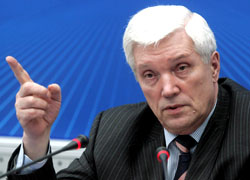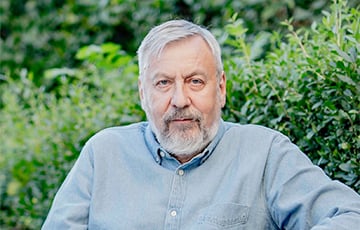Russian ambassador: “I wish there were more freedom of speech both in Russian and in Belarus”
19- 11.06.2009, 15:16

For the first time in 11 years, journalists of the Charter’97 press center have been invited to a press conference given by the Russia’s ambassador in Minsk.
Though a formal reason for the today’s press conference was Day of Russia, celebrated in the neighbouring countries on June 11, Aleksandr Surikov answered topical questions about Belarusian-Russian relations.
Contrary to the expectations of journalists, estimations of the Russian ambassador were kept in low profile, but even this allows making certain conclusions.
Difficulties with “union state”
The diplomat noted at the beginning of the press conference:
“A range of difficult question raised and are raising in the process of building the “union state” of Belarus and Russia. It’s natural. We are gradually turning to equal market principles of trade and economic relations between the two countries. We must have a clear understanding of the fact both Russia and Belarus need to increase competitive strengths of their economies, in other case it will be difficult for the two courtiers to preserve independence under conditions of economic globalization.”
About Lukashenka’s criticism of Russian officials
Commenting to the Charter’97 press center on the resent remarks of Alyaksandr Lukashenka to Russian Prime Minister Vladimir Putin and minister of finance Aleksey Kudrin, the former made after Russia had refused to grant a loan in dollars, Surikov said:
“One should be able to come down, make less sharp remarks, speak in a calm tone.”
He reminded the situation when French President Nikolas Sarkozy’s remarks to the leaders of the EU states leaked to press.
“Sarkozy managed to find a way out of the situation preserving good bilateral relations. Such a skill is necessary for a politician and a top official. This is the most important skill,” the ambassador noted.
About disputable loan of $500 billion
Answering the question why Russia refused to give a $500-billion credit to Belarus, the Russian diplomat said:
“I’m sorry to hear such an interpretation of this situation with 500 billion of dollars that are still under consideration by Russia. Russia hasn’t refused to grant the money! Neither offered it to give the loan in Russian rubles. You said you were short of money, in particular, Belarusian rubles. Russia asked if you agreed to accept rubles instead of dollars. You said you needed dollars. Well, it’s ok if you want dollars... But taking into account the crisis, the Russian minister of finance said we would think about accounting for a month. So the question is still open.”
What to possibilities of gaining a loan from the Anti-Crisis Fund of the Eurasian Economic Community, Surikov noted that Belarus hadn’t allocated any money to it yet.
“The Anti-Crisis Fund has been created within frames of EurAsEC. The main fund holder is Russia. It allocates 7.5 billion out of 10 billion dollars. Kazakhstan offered one billion of dollars, the rest countries must to form packages to have the right to vote for disposition of the fund to overcome the crisis. I don’t exclude a question of giving $500 million to Belarus may be considered, but Russia will remain its main holder,” the ambassador said adding that “Belarus hasn’t formed its package for the anti-crisis fund.”
Answering the question whether it will be an additional credit or a long-expected Russian one, the ambassador said:
“These 7.5 billion dollars in the EurAsEC fund also belong to Russia! Such things may be correlated, but may be not correlated.
About the ban on importing Belarusian milk to Russia
The Russian diplomat thinks imposing sanctions on Belarusian dairy products defends interests of Russian consumers.
“I can’t imagine where journalists have found a collision here. The issue is imposing new technical regulations for milk products by Russia. Regulatory authorities of the two countries are not solving this collision. This period will end. The main thing here is defence of interests of consumers. We mustn’t allow that people can get poisoned. The things are running in a groove, but press always looks for sensations. Frankly speaking I nearly suffocated in this paper milk,” he noted.
Everything should be legally executed with Belarus leadership
Aleksandr Surikov thinks an agreement between Belarus and Russia on buying gas at annual average price must be executed legally.
“It would be better if the agreement on annual average gas price were executed legally, were written down in contracts,” he said.
The ambassador told legal execution of the agreement on annual average gas price was needed to “avoid legal troubles”.
“Belarus didn’t’ have annual average price debts, but I don’t exclude the contracted price may cause debts. So, we must legally execute this oral arrangement to avoid legal troubles in future,” Surikov said and reminded that Gazprom paid for gas transit in advance for three months.
Medvedev’s visit to Minsk still under question
The Russian ambassador said it hadn’t defined yet whether Russian President Dmitry Medvedev could visit Belarus on official Independence Day of Belarus marked on July 3.
“I don’t know so far if Russian President Dmitry Medvedev will visit Minsk on Independence Day July 3. I don’t have any information about this,” Surikov said.
“I may say something wrong...”
The diplomat was asked whether he thinks another devaluation of the ruble is needed in Belarus if the Russian minister of finance Aleksey Kudrin was right when he said Belarus was going to bankrupt.
Surikov was careful:
“You’d better asked Mr Kharkavets (minister of finance of Belarus – note of Charter’97) about this. Why do you ask me? I may say something wrong... I have my own view of this issue and I am not going to express it. Mr Kharkavets has his vision. Mr Kudrin has his vision. The IMF has its won view. I can say mine, but for what?”
Lack of freedom
At the end of the press conference, the Charter’97 press center asked Aleksandr Surikov to say which of the countries, Russia or Belarus, has more freedom of speech.
After some seconds of thinking, the Russia’s ambassador said: “I wish there were more freedom of speech in both countries.”










